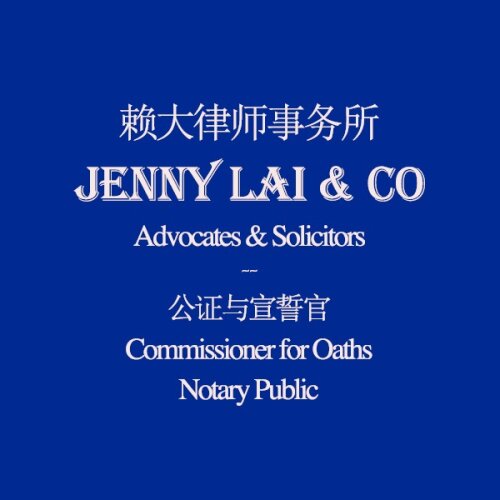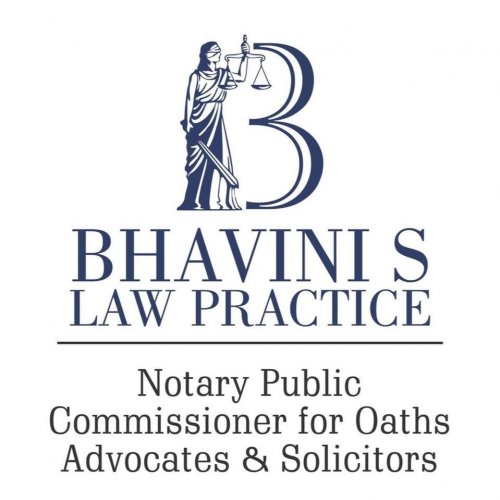Best Inheritance Law Lawyers in Singapore
Share your needs with us, get contacted by law firms.
Free. Takes 2 min.
Or refine your search by selecting a city:
List of the best lawyers in Singapore
About Inheritance Law in Singapore
Inheritance law in Singapore governs how a person’s estate is distributed after death. It covers wills, the rights of spouses and children under intestacy rules, and the processes to validate and administer an estate. The core concepts include probate, letters of administration, executors and administrators, and the distribution of assets. Understanding these basics helps you plan ahead and resolve disputes more effectively.
In practice, Singaporeans often encounter three related paths: planning with a will, handling intestate estates when there is no will, and navigating probate or administration procedures after death. The law also addresses cross-border assets and trusts within estate planning contexts. Professional guidance from a solicitor or legal counsel is commonly prudent given the complexity of assets and family arrangements.
Why You May Need a Lawyer
Here are concrete, real-world scenarios in Singapore where you typically need Inheritance Law legal help:
- You are named as the executor in a will and must obtain a grant of probate to administer the estate, including collecting assets and paying debts.
- The deceased left a will but a beneficiary challenges its validity or questions its interpretation, requiring a contest or clarification.
- You must handle an intestate estate where there is no will, and you need to identify rightful heirs and apply the correct intestate distribution rules.
- The estate includes foreign or offshore assets, or assets held in trust, creating cross-border administration and tax planning issues.
- There is potential liability for debts, taxes, or unpaid obligations that could affect how assets are distributed to heirs.
- You need to resolve disputes among beneficiaries, trustees, or executors about asset valuation, distributions, or fiduciary duties.
- You suspect a will may have been obtained by undue influence, fraud, or lack of testamentary capacity, prompting a formal challenge.
Note that Singapore does not levy an estate duty on estates since 2008, which affects how executors plan debt payment and asset settlement. See official guidance for tax matters on IRAS’s website.
Local Laws Overview
The following statutes are central to Inheritance Law in Singapore. They regulate how wills are created, how estates are administered, and how intestate distributions are determined. For current texts, see official government resources.
- Intestate Succession Act (Intestate Succession) - Governs the distribution of estates when a person dies without a valid will. It sets out the hierarchy of heirs and shares where no testamentary direction exists. Singapore Statutes Online provides the current version of this act.
- Probate and Administration Act - Establishes the process to obtain probate or letters of administration, enabling the lawful collection and distribution of a deceased person’s assets. Singapore Statutes Online contains the latest consolidated text.
- Wills Act - Sets out the formal requirements for valid wills, including execution and witnessing requirements. Singapore Statutes Online provides the current version of this act.
In addition to these acts, a grant of probate or administration may be required to transfer assets such as real property or bank-held funds. The High Court Probate Registry oversees the process, and practitioners in Singapore will typically reference the acts above when advising clients.
Estate duty has been abolished in Singapore since 15 February 2008, so there is no tax on estates under normal circumstances.
For practical reference on official guidance, see resources from Singapore Statutes Online and IRAS. These sources reflect the current framework and any amendments up to the present date.
Frequently Asked Questions
What is probate and why do I need it?
Probate is the court process to confirm a will is valid and to appoint an executor to administer the estate. It provides legal authority to collect assets and pay debts before distribution.
How do I apply for probate or letters of administration?
You file an application with the High Court Probate Registry. A solicitor can help assemble the required documents, including the death certificate and will, if any.
What is the difference between probate and letters of administration?
Probate applies when there is a valid will and an executor is appointed. Letters of administration apply when there is no will or the executor cannot act.
Do I need a lawyer to handle probate?
While not legally required, a solicitor or legal counsel familiar with probate matters helps ensure correct forms, asset valuation, and timely submission.
How much does probate cost in Singapore?
Costs vary by estate complexity and solicitor rates. Typical ranges include filing fees plus professional charges for administration and possible court fees.
How long does probate take in Singapore?
Timelines vary widely. Simple estates may take several months; complex estates with disputes or overseas assets can take a year or more.
Do I need to probate real estate or property held in my name?
Property transfers usually require probate or administration by the executor or administrator to be legally enforceable.
What happens if there is no will?
The estate is distributed under the Intestate Succession Act according to the statutory order of heirs and shares.
Can a will be contested after it is made?
Yes. Grounds include lack of testamentary capacity, undue influence, fraud, or improper execution. A court may invalidate or modify provisions.
What if assets are overseas or held in trusts?
Cross-border and trust assets require additional considerations, including local law recognition and possible international probate processes.
Should I amend an existing will after major life events?
Yes. Major events like marriage, divorce, birth, or death in the family can affect eligibility and shares, so updating a will is prudent.
Is there a difference between an executor and an administrator?
An executor is named in a will to administer the estate; an administrator handles estates without a valid will or when the named executor cannot act.
Additional Resources
- Singapore Statutes Online - Official repository of current statutory texts for Singapore acts, including Intestate Succession, Probate and Administration, and Wills Acts. https://sso.agc.gov.sg
- Inland Revenue Authority of Singapore (IRAS) - Government authority for tax treatments affecting estates, including no estate duty in Singapore. https://www.iras.gov.sg
- Ministry of Law - Official policy and information on family law, estates, and related matters in Singapore. https://www.mlaw.gov.sg
Next Steps
- Identify your goal and who is involved. Gather the death certificate, will, asset list, and known debts. Timeframe: 1-2 weeks.
- Determine whether probate or administration is required. Confirm if there is a will and who the executor is. Timeframe: 1-2 weeks after document gathering.
- Find a Singapore solicitor or legal counsel with probate experience. Obtain at least 2 quotes and check client reviews. Timeframe: 2-4 weeks.
- Engage the lawyer and provide complete asset information, including overseas holdings if any. Prepare the application for probate or letters of administration. Timeframe: 2-6 weeks.
- Submit the probate or administration application to the High Court and respond to any court requests. Timeframe: 1-4 months depending on complexity.
- Manage the estate by paying debts, distributing assets in accordance with the will or intestacy rules, and finalising accounts. Timeframe: ongoing until assets are distributed.
- Keep beneficiaries informed and obtain a formal discharge once distribution is complete. Timeframe: depends on estate size and disputes, typically months after settlement.
Disclaimer: This is general information and does not constitute legal advice. For your specific situation, consult a qualified solicitor or legal counsel in Singapore.
Lawzana helps you find the best lawyers and law firms in Singapore through a curated and pre-screened list of qualified legal professionals. Our platform offers rankings and detailed profiles of attorneys and law firms, allowing you to compare based on practice areas, including Inheritance Law, experience, and client feedback.
Each profile includes a description of the firm's areas of practice, client reviews, team members and partners, year of establishment, spoken languages, office locations, contact information, social media presence, and any published articles or resources. Most firms on our platform speak English and are experienced in both local and international legal matters.
Get a quote from top-rated law firms in Singapore — quickly, securely, and without unnecessary hassle.
Disclaimer:
The information provided on this page is for general informational purposes only and does not constitute legal advice. While we strive to ensure the accuracy and relevance of the content, legal information may change over time, and interpretations of the law can vary. You should always consult with a qualified legal professional for advice specific to your situation.
We disclaim all liability for actions taken or not taken based on the content of this page. If you believe any information is incorrect or outdated, please contact us, and we will review and update it where appropriate.
Browse inheritance law law firms by city in Singapore
Refine your search by selecting a city.
















